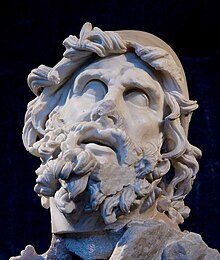| Odysseus | |
|---|---|
 Head of Odysseus from a Roman period Hellenistic marble group representing Odysseus blinding Polyphemus, found at the villa of Tiberius at Sperlonga, Italy | |
| In-universe information | |
| Title | King of Ithaca |
| Spouse | Penelope |
| Children | Telemachus, Telegonus, Cassiphone, Agrius, Anteias, Ardas, Rhomos, Poliporthes, Latinus, Nausinous, Nausithous, Euryalus |
| Relatives | Laertes (father) Anticlea (mother) Ctimene (sister) |
| Nationality | Greek |
| Part of a series on |
| Greek mythology |
|---|
 |
| Deities |
| Heroes and heroism |
| Related |
|
|
In Greek and Roman mythology, Odysseus (/əˈdɪsiəs/ ə-DISS-ee-əs;[1] ‹See Tfd›Greek: Ὀδυσσεύς, Ὀδυσεύς, translit. Odysseús, Odyseús, IPA: [o.dy(s).sěu̯s]), also known by the Latin variant Ulysses (/juːˈlɪsiːz/ yoo-LISS-eez, UK also /ˈjuːlɪsiːz/ YOO-liss-eez; Latin: Ulysses, Ulixes), is a legendary Greek king of Ithaca and the hero of Homer's epic poem the Odyssey. Odysseus also plays a key role in Homer's Iliad and other works in that same epic cycle.[2]
As the son of Laërtes and Anticlea, husband of Penelope, and father of Telemachus, Acusilaus, and Telegonus,[3] Odysseus is renowned for his intellectual brilliance, guile, and versatility (polytropos), and he is thus known by the epithet Odysseus the Cunning (‹See Tfd›Greek: μῆτις, translit. mêtis, lit. "cunning intelligence"[4]). He is most famous for his nostos, or "homecoming", which took him ten eventful years after the decade-long Trojan War.[5]
- ^ "Odysseus". Lexico UK English Dictionary. Oxford University Press. Archived from the original on 25 June 2021.
- ^ "Odysseus". Archived from the original on 24 April 2021. Retrieved 24 April 2021.
- ^ Epic Cycle. Fragments on Telegony, 2 Archived 29 August 2020 at the Wayback Machine as cited in Eustathias, 1796.35.
- ^ "μῆτις – Liddell and Scott's Greek-English Lexicon". Perseus Project. Archived from the original on 4 September 2018. Retrieved 18 April 2018.
- ^ "Greek & Roman Mythology - Homer". www2.classics.upenn.edu. Retrieved 30 July 2024.